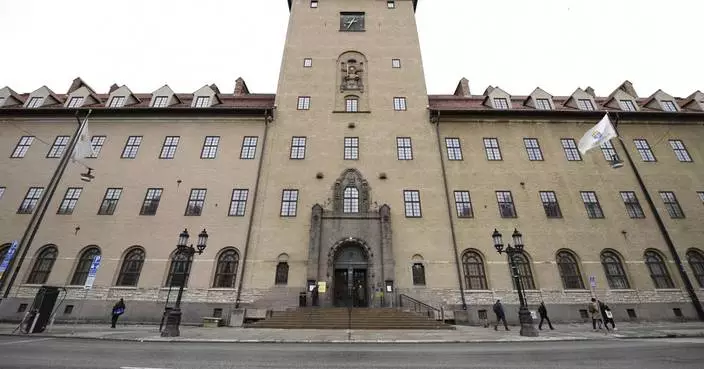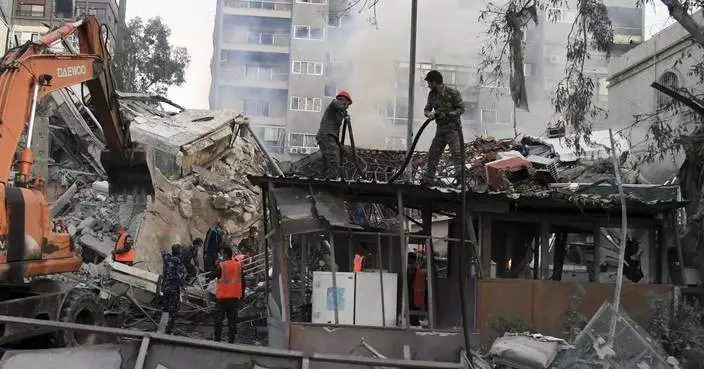Turkey's president announced Tuesday that a Russian delegation would arrive the following day to resume talks aimed at easing tensions in northwestern Syria. He also said no consensus was reached for a four-way meeting next month between the leaders of France, German, Russia and Turkey.
However, Recep Tayyip Erdogan said Russia's Vladimir Putin may still come to Turkey next week for a bilateral meeting. Moscow has so far not confirmed a March 5 visit by the Russian president to Turkey. Erdogan spoke to reporters before departing for a visit to Azerbaijan.
Tensions have been running high amid a Syrian government forces offensive in Idlib and parts of Aleppo province, the last remaining rebel-held territories in Syria. The government forces have captured dozens of towns and villages in the Russian-backed offensive since December. More than 900,000 people have been displaced, many of them now crowding an area close to the border with Turkey.
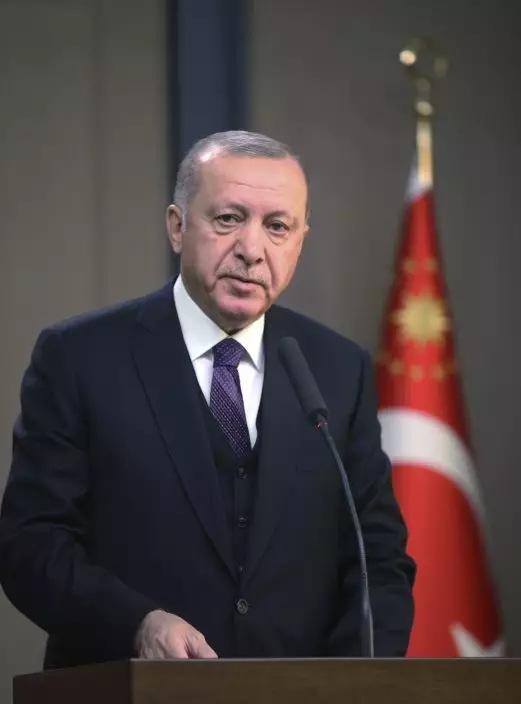
Turkish President Recep Tayyip Erdogan speaks to the media prior to departure for Baku, Azerbaijan, at the airport, in Ankara, Turkey, Tuesday, Feb. 25, 2020. Erdogan said a Russian delegation will visit Turkey Wednesday to discuss the situation in Idlib, Syria. (Presidential Press Service via AP, Pool)
The Syrian government offensive has also shattered a fragile cease-fire agreement that Turkey and Russia reached in 2018, despite supporting rival sides in the Syrian conflict. Turkey has threatened military action unless Syrian forces retreat to positions they held before the advance.
"Russia supports Syria at the highest level," Erdogan said. “Even if they deny it, we have evidence. We are forced to be in this fight.”
"A delegation from Russia will arrive in our country tomorrow," Erdogan also said. Turkish officials had reported small progress in two previous rounds of Turkey-Russia meetings but said the results were not satisfactory.

Turkish President Recep Tayyip Erdogan speaks to the media prior to departure for Baku, Azerbaijan, at the airport, in Ankara, Turkey, Tuesday, Feb. 25, 2020. Erdogan said a Russian delegation will visit Turkey Wednesday to discuss the situation in Idlib, Syria.(Presidential Press Service via AP, Pool)
Turkey had set up a dozen observations as part of the 2018 agreement, many of which are now behind Syrian government lines. Ankara has sent thousands of troops into Idlib in recent weeks.
At least 16 Turkish soldiers were killed in clashes during the Syrian government's push on the last rebel stronghold.
BEIRUT (AP) — Amnesty International said Wednesday it has documented widespread abuses, including torture and deprivation of medical care, in detention facilities holding thousands of suspected Islamic State members and their relatives in northeast Syria.
The centers and camps hold about 56,000 people — the majority of them children and teens — and are run by local authorities affiliated with the U.S.-backed, Kurdish-led Syrian Democratic Forces. The SDF and its allies, including U.S.-led coalition forces, defeated the Islamic State group in Syria in 2019, ending its self-proclaimed Islamic “caliphate” that had ruled over a large swath of territory straddling Iraq and Syria.
What to do with the suspected IS fighters and their families has become an intractable issue. Many countries whose citizens traveled to Syria to join IS have been reluctant to repatriate them, as have local communities in Syria.
"People held in this system are facing large-scale violations of their rights, some of which amount to war crimes,” Nicolette Waldman, Amnesty’s senior crisis advisor, told journalists.
The United States is also responsible for the alleged violations because it played a key role in establishing and maintaining the detention system, providing hundreds of millions of dollars to the SDF and affiliated forces and regularly interrogating detainees, Waldman said.
The human rights group interviewed 126 people accused of IS affiliation currently or formerly detained, along with representatives of the local administration and aid workers.
The Amnesty report said the vast majority of detainees are being held “indefinitely, without charge or trial, in violation of international human rights law and international humanitarian law,” while those who have been tried were, in many cases, convicted on the basis of confessions extracted under torture.
The alleged abuses include “beating, stress positions, drowning, electric shocks and gender-based violence,” including a male detainee who said he and others had been sodomized with broomsticks by guards, the report said. Detainees were also deprived of food, water and medical care and subjected to extreme cold and heat in overcrowded cells, with some allegedly dying of suffocation, it said.
The report added that many of the approximately 14,500 women and 30,000 children held had been victims of human trafficking, including women who were forced to marry IS fighters and minors who were forcibly recruited by the group, and that local authorities had failed to set up a “mechanism to identify trafficking victims” and protect them.
The report also criticized the practice of forcibly separating adolescent boys — some as young as 11 or 12 — from their mothers and placing them in rehabilitation centers indefinitely.
Amnesty called on local authorities, the U.S. government and other allies to bring the detention system into compliance with international law and urged the United Nations to work with them to establish a screening process to release all who are not “reasonably suspected” of having committed a serious crime.
The Autonomous Authorities of the North and East Syria Region, the civilian administration affiliated with the SDF, wrote in response to the Amnesty findings that it had not received any official complaints regarding torture in detention facilities and “if this happened, they are individual acts.”
The administration said it would take action against employees who committed violations if evidence is provided. It denied allegations that inmates were deprived of food, water and medical care. It acknowledged overcrowding in the facilities, which it attributed to lack of financial resources to secure larger centers.
The local authorities took issue with the allegation that people were arbitrarily detained, asserting that most detainees “are members of a terrorist organization and were arrested during the battles" and that many had committed crimes against humanity and war crimes.
The U.S. State Department said in its own response that “we share many of (Amnesty’s) concerns” and it has been working to address them. It called on the international community to “aid local entities’ management of these challenges” and for countries with citizens held in detention in Syria to repatriate them.
Waldman said she believes Washington "very likely knew about these poor conditions from the beginning."
She added: “We think that it may not be the case that they are doing everything they can. They need to accept a much greater responsibility, especially since they played such a key role in establishing the situation in the first place."
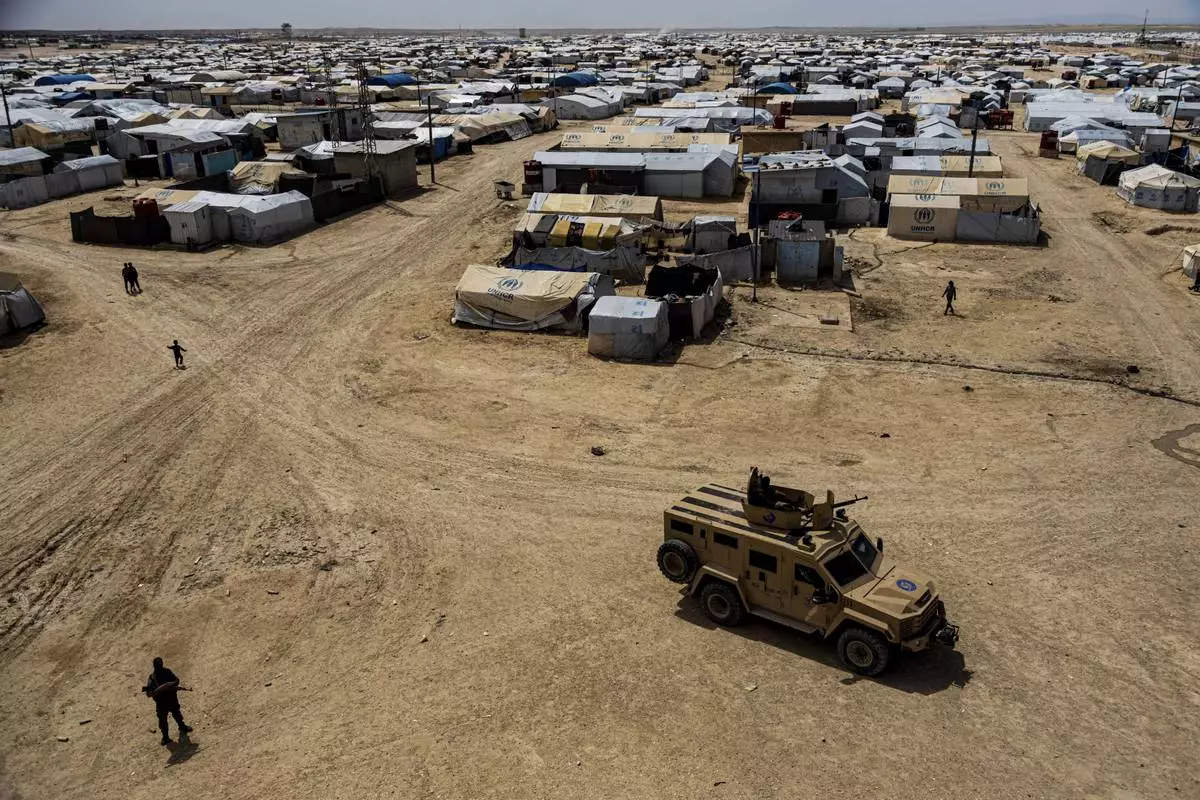
FILE - Kurdish forces patrol al-Hol camp, which houses families of members of the Islamic State group in Hasakeh province, Syria, on April 19, 2023. Amnesty International said Wednesday, April 17, 2024 it has documented widespread abuses, including torture and deprivation of medical care, in detention facilities holding thousands of suspected Islamic State members and their relatives in northeast Syria. (AP Photo/Baderkhan Ahmad, File)
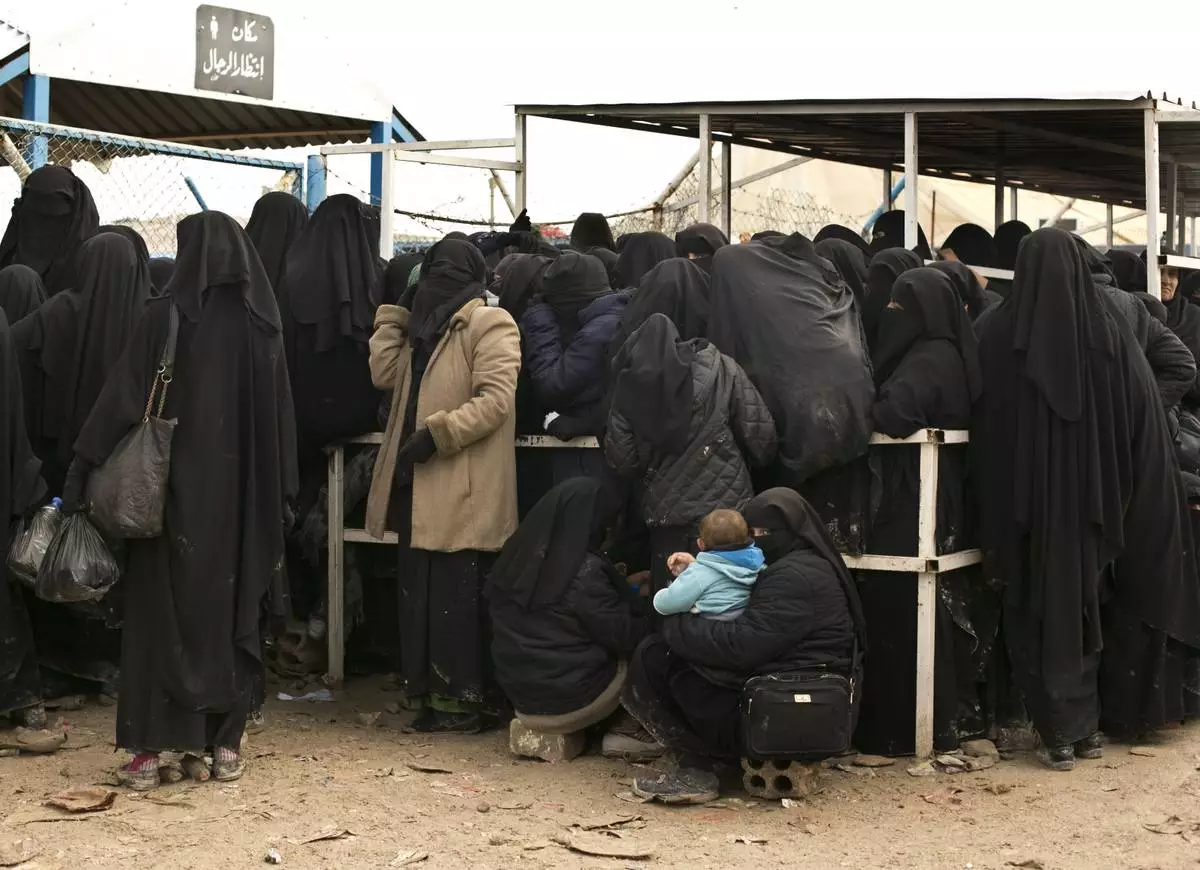
FILE - Women residents from former Islamic State-held areas in Syria line up for aid supplies at Al-Hol camp in Hassakeh province, Syria, March 31, 2019. Amnesty International said Wednesday, April 17, 2024 it has documented widespread abuses, including torture and deprivation of medical care, in detention facilities holding thousands of suspected Islamic State members and their relatives in northeast Syria. (AP Photo/Maya Alleruzzo, File)









